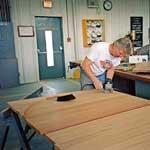- Posts: 10449
- Thank you received: 70
Faster than light
- Blazer Bob
-
 Topic Author
Topic Author
- Mountain Legend
-

Where’d that neutrino come from? The future
By Richard Chirgwin • Get more from this author
Posted in Physics, 22nd September 2011 21:39 GMT
Only weeks since mathematicians proved it couldn’t be done, CERN boffins have put the smile back on sci-fi fans’ faces everywhere by discovering neutrinos travelling faster than light.
The astonishing results, reported by Reuters and others, came as the result of the OPERA experiment in which 15,000 beams of neutrinos were fired from Geneva to the Gran Sasso in Italy.
http://www.theregister.co.uk/2011/09/22 ... neutrinos/
Please Log in or Create an account to join the conversation.
- Rockdoc
-

- Mountain Legend
-

Please Log in or Create an account to join the conversation.
- Blazer Bob
-
 Topic Author
Topic Author
- Mountain Legend
-

- Posts: 10449
- Thank you received: 70
Rockdoc Franz wrote: While the prospect of faster than light speed is fascinating. While Further experimentation aimed at duplicating the neutrino results still need to happen for substantiating the science, already the expressed fear of how the public will react and how things should be reported smacks of political correctness. Mostly it is an expression of trying to simplify things or make it "really" understandable for a less than intelligent public... insulting at best. Why the concern over how the public will react to new science? WHat threat does it pose how someone thinks about the results? Eeee gads, give me a F break.
I did not pay any attention to that part. I am excited by the possibility of FTL travel. As a former sci-fi addict I say screw pax America, I say pax humanity. Lets conquer the galaxy. We could even give an entire solar system to liberals.
Please Log in or Create an account to join the conversation.
- Rockdoc
-

- Mountain Legend
-

Please Log in or Create an account to join the conversation.
- Blazer Bob
-
 Topic Author
Topic Author
- Mountain Legend
-

- Posts: 10449
- Thank you received: 70
Please Log in or Create an account to join the conversation.
- Rockdoc
-

- Mountain Legend
-

neptunechimney wrote: I just glanced at his home page. Nothing looked familiar.
I've a bunch of his books. I quite like the Honor series. It took me a while to get into it, namely to sort out who what who. Once past that they were a good read. If you should want to borrow some, let me know.
BTW, did you get your wood?
Please Log in or Create an account to join the conversation.
- Blazer Bob
-
 Topic Author
Topic Author
- Mountain Legend
-

- Posts: 10449
- Thank you received: 70
Rockdoc Franz wrote:
neptunechimney wrote: I just glanced at his home page. Nothing looked familiar.
I've a bunch of his books. I quite like the Honor series. It took me a while to get into it, namely to sort out who what who. Once past that they were a good read. If you should want to borrow some, let me know.
BTW, did you get your wood?
Got the wood, thanks. Sure, I would like to borrow the first in the series and see what I think.
Please Log in or Create an account to join the conversation.
- Blazer Bob
-
 Topic Author
Topic Author
- Mountain Legend
-

- Posts: 10449
- Thank you received: 70
Please Log in or Create an account to join the conversation.
- Rockdoc
-

- Mountain Legend
-

Please Log in or Create an account to join the conversation.
- Blazer Bob
-
 Topic Author
Topic Author
- Mountain Legend
-

- Posts: 10449
- Thank you received: 70
Rockdoc Franz wrote: Seeing space makes me think of space travel. Where will it all be in 100 years? Even at if neutrinos can speed along faster than light, it still will not get humans to habitable solar systems out there. We need to work on the time dimension to accomplish that.
Who knows what it could evolve into over time. I doubt that Otto ever envisioned what we have today.
"In 1660, a German experimenter named Otto Von Guericke built the first electric generating machine. He showed that electricity could be transmitted by using a wet string to conduct electricity several feet. "
Or Thales.
"Around 600 BCE, in Greece, a mathematician named Thales discovered that amber rubbed with animal fur attracted light objects."
http://library.thinkquest.org/6064/history.html
Please Log in or Create an account to join the conversation.







